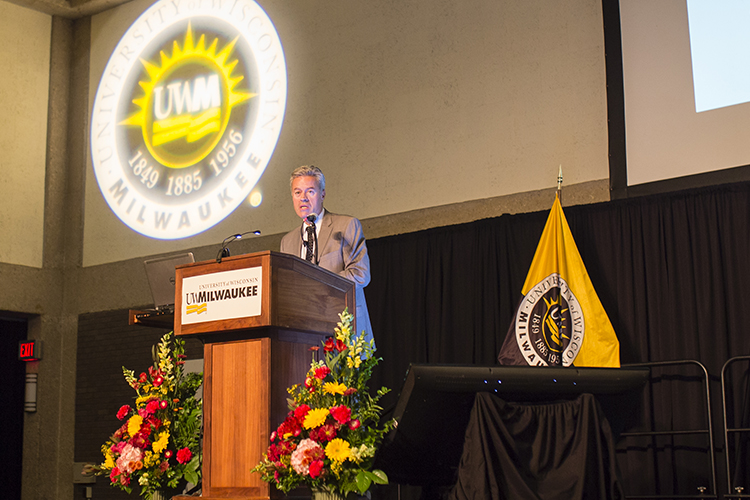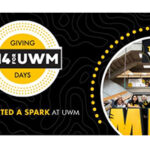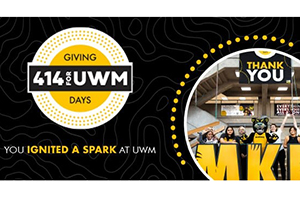UW-Milwaukee is responding to a continually challenging and changing context for higher education, Chancellor Mark Mone said Thursday in his fall plenary address.
A major underpinning of these efforts is this week’s public launch of Made in Milwaukee, Shaping the World: The Campaign for UWM, a fundraising campaign with goal of $200 million to boost student success, promote research excellence and enhance community engagement, Mone said. More than $170 million has already been raised.
“This is the most ambitious plan in the history of UW-Milwaukee,” he said, and reflects the community’s faith in what the university does. He listed a number of recent accomplishments that demonstrate the university’s ability to thrive within a changing context:
- The accreditation of the Joseph J. Zilber School of Public Health, “the first public health school accredited in the state of Wisconsin.”
- Funding for the new Lubar Entrepreneural Center, which “cuts across every school and college and provides opportunities for innovative, entrepreneurial thinking.”
- A projected increase in new freshmen enrollment of 3.8 percent, based on preliminary numbers.
- An increase in the number of new freshmen from Illinois of 8 percent, and increases in the number of master’s and underrepresented students. “For us to do this with the headwinds we face is a significant accomplishment.”
- An increase in the percentage of students moving from first year to second year – the retention rate – to a historic high of 74 percent.
- Being named a one of the Top 50 schools by Sierra Magazine for environmental efforts – “that type of ecoliteracy is an important draw” for students, Mone said.
- Ranking as one of the top 25 LGBTQ-friendly universities.
UWM continues to play a major role as a top research university that is accessible and affordable, Mone said. In meeting with alumni all over the country, he frequently hears from them that they owe their success to UWM. One told him, “Everything I’ve accomplished in my life was because of UWM.”
Changing demographics are a fact of life, Mone said, in particular in Wisconsin where the number of high school graduates is shrinking. “We’re running out of teenagers.” Overall enrollment is expected to drop 2.4 percent this fall, less than the 4 percent expected.
Uncertainty about federal and state support is also a factor, though Mone emphasized that the current state budget was the most positive for UWM in the past 10 years, with funding for pay raises and capital improvements to the Northwest Quad and Sandburg Residence Hall, among a number of projects.
At the federal level, the university needs to continue to work with legislators for increased research funding, Mone said. And, for UWM, the elimination of the Pell Grant program would be extremely challenging. More than 130,000 UW System students rely on the grants, and a significant number of them are at UWM.
Any one of those factors would have an impact on UWM, but added together they provide major challenges, the chancellor said.
“If the context changes, we have to continue changing to meet that changed future,” Mone said.
In his address, the chancellor reaffirmed UWM’s focus on providing a safe and inclusive environment for all students in the midst of ongoing conversations about eliminating the Deferred Action for Childhood Arrivals program, Title IX changes, transgender rights and free speech/hate speech issues.
On DACA, he said: “We wholly support all our dreamers and the continuation of DACA program.” He stressed that it was important for both faculty and staff to understand what students and their families are going through.
UWM will continue to improve its learning environment, research efforts and community involvement, Mone said. Work groups are leading efforts in each of these areas.
The university aims to improve retention and graduation rates, helping students overcome challenges in taking remedial courses. Mone noted that historically 50 percent of incoming UWM students have needed remedial work, compared with a national average of 20 percent, but changes in teaching and learning approaches are bringing those numbers down.
In the area of research, plans are underway to increase interdisciplinary research teams and attract and retain excellent graduate students by increasing stipends.
Other new projects underway include the Freshwater University, bringing together faculty, curriculum and research related to freshwater issues, and the Connected Systems Institute, supported by a major grant from Rockwell Automation.
UWM will also continue its commitment to community engagement. Last year, the university community contributed 66,624 hours of service. And faculty and staff are deeply engaged in projects such as M³, a collaborative effort with Milwaukee Public Schools and MATC to help students graduate and move on to college. There are 150 employees across the partnership working to positively affect 145,000 MPS students, he noted.
With new employment opportunities developing – Foxconn is one example – it’s vital that the university help increase the number of college graduates in the state.
“The big idea here is that the context has changed, and we need to address that head on.”







